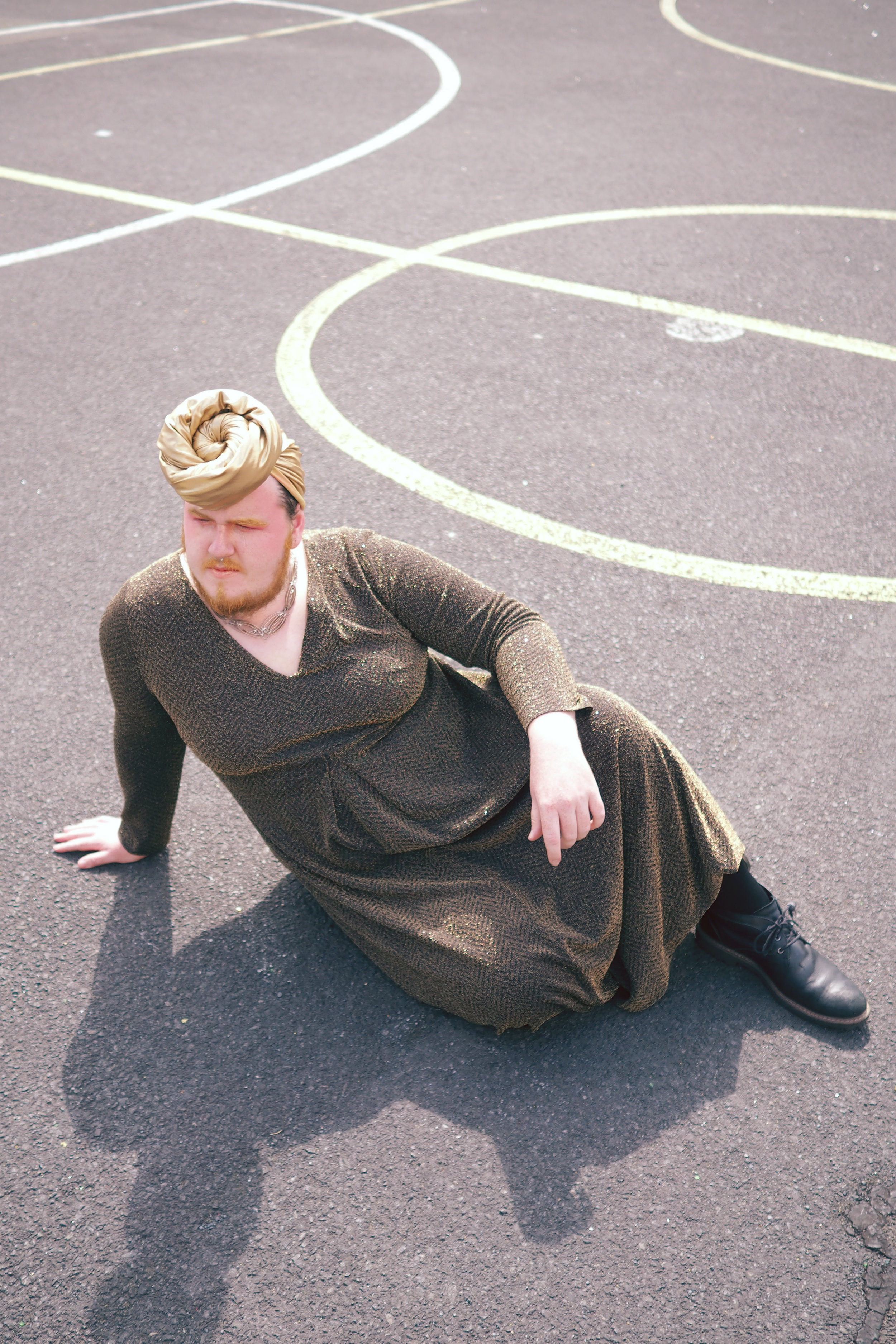Wren Dennehy
I’m from Leixlip, County Kildare, and I was born to two God-fearing, spud-eating country parents who are mad into the GAA. I’m the eldest of three boys and the only queer person in my family. The rest are cisgender and very heteronormative. Wren Dennehy is an inter gender drag entity otherwise known as Avoca Reaction, queer performer and a creative producer. Here, they speak with masc about coming out, compassion, healing as a queer community and more.
I’ve had issues with my parents in relation to my queerness and their attitudes to my queerness. As I’ve grown older, I can’t really be angry with them about that. Something I realised about Ireland is how new [visible] queer culture is. I now understand that they come from a society where I didn’t exist.
When your relationship with your family isn’t clear cut, or ‘queer cut’, you have to have a deeper level of understanding. You have to interpret everything they say, be it concerns around safety, dressing up or wearing make-up. When I was younger, I would have just screamed that they didn’t understand me and slammed the door. Now, I have to put it through a translator in my head to better understand the intention behind what’s being said.
As queers, people tend to lump us together. It can be really hard to carve out your own identity and separate yourself from stereotypes or media portrayals. I take huge issue with the LGBTQ categorisation system. I firmly believe that that’s not for us as queer people: it’s for the cis, straight community so that they understand us, and categorise us so they feel safer.
I feel the same about coming out. Coming out isn’t for the queer person. It’s to warn the straight people around you that you’re queer, so they can guard themselves against that or be on their toes. As queer people, we’re expected to be so open about our sex life, about our romantic life, about our gender identity and our sexuality in a way that straight people never have to dream of.
As a visible non-binary person, people constantly ask me what non-binary is. As much as I enjoy spreading the word and spreading the love, that’s also time spent not getting to know the actual me. I don’t open every conversation with, “tell me about your heterosexuality”. That’s not time well spent. It’s very private and sensitive. And also, everybody has a phone in their pocket with an internet connection. If you don’t know what non-binary is, then fucking Google it.
Before I came out as non-binary, I had a lot of passing privilege and I could play straight when I wanted to. Now I’ve no interest in that. I feel really conscious and on my toes around how I come across as a visibly queer person because there aren’t that many of us. Maybe I’m overly conscious about being seen to do good as a queer person so people can’t demonise us as easily.
I get stared at all the time and not in a respectful way. To the outside world, that might seem great to get all that attention. It’s not. I think people assume that you’re “doing it for attention”. I’m doing this for me. I dress the way I want for me. If someone takes something positive away from it, that’s a bonus. I’m committed to being visible for myself and other people – but mainly for myself.
Everyone looks at everyone else all the time but I get an extra two or three seconds of airtime. It’s draining. Is it really transgressive to present a certain way? I don’t live in fear but I know there’s a chance I could be assaulted. I’ve bad habits of walking home at 6am in drag and that’s putting myself in a really vulnerable position when it shouldn’t matter. This is my city too.
Especially in drag, people feel entitled to your time. They feel entitled to touch you. They feel entitled to be able to steal you away. I could sympathise with women before for being objectified but now I can really empathise with them. It’s the exact same feeling. The language of oppression, marginalisation or objectification really doesn’t vary that much. I’m quite an optimist naturally, but I’m getting disheartened by the lack of personal, physical or emotional respect out there. I’m realising in order to protect myself, to protect my magic, I need to build a little bit of a wall.
A community is only as healthy as its individual members, and there’s a lot of healing to be done in our community. We all have to take time to heal personally. Every queer person in Ireland has to deal with trauma [as a result of] bullying and marginalisation. Because of that trauma, we all have a little seed of anger and that has to go somewhere. The more you’ve been hurt, the more that grows and the more toxic it becomes. At some point you have to deal with it. It all depends on your experience. I was bullied really badly for almost fifteen years, so that’s a very obvious piece of trauma that luckily I’ve had the money and the time to work on in therapy. Clear the shit out of your brain; process the stuff you can’t get rid of and turn it into something useful.
[That trauma] is where so much bitchiness [on the scene] comes from. Venues can be so standoffish because there’s unprocessed anger there that we’re throwing back at our own. In particular, I feel really strongly about ‘reading’ and ‘shade’. They originate in the ball scene in New York and London. In those communities, people were so trusting, so tight and so filled with love. They were best friends and chosen family: reading and shade come from that place. You’ve to have a really deep trust before you can take the piss out of someone. Today, Drag Race has glamourised reading and shade so that I now have strangers coming up to me saying something really horrible and going, “Ooh, the shade I just read you”. No. You don’t know me, you don’t love me, you don’t trust me and you don’t respect me. That’s not shade or reading – that’s bullying.
We need to look inward. We need to look at ourselves and ask, “have I dealt with my trauma?”. And if not, where is it going? Am I projecting it on my partner? On strangers I meet in a queer space? On my friends or on my family? Because it’s going somewhere. And if you’re not aware of that, people are going to think you’re an asshole. And you’re not an asshole! You wouldn’t adopt a dog from a shelter and expect them to be the best boy – you’ve got to give them time to acclimatise. That’s how I feel. We’re all like shelter dogs.
My baseline is love. I’m a love-giver. What I want to do with my art, my performance and my life is to cultivate more of a culture of positivity and healing and love, rather than tearing each other down to get a level up. Otherwise, you gain nothing.







